Review: THE CAKE at Stageworks Theatre is a Sweet and Occasionally Filling Look at Gay Marriage in the South
The production, now running from March 18 to April 3, features two brides, a respectable baker, and a lot of cake.
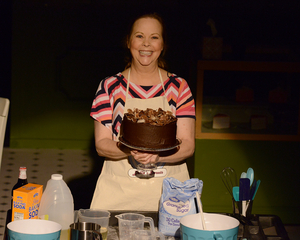
There is a moment in Stageworks Theatre's production of Bekah Brunstetter's The Cake in which the character Jen (played with Southern Belle sweetness by Ashley Cooper) breaks down to Della (her "unofficial godmother," as the play puts it) about her desire to marry the woman she loves. She knows that the people of her North Carolina hometown disapprove, and she is begging Della for something - anything - to tell her that it's okay-that loving whom she loves does not mean having to give up where she comes from.
"But I love her!" Jen exclaims with childlike desperation that made me want to climb up on the stage and hug her. Cooper delivers this line with heartbreaking simplicity - as if her entire argument for why she should be able to have her dream wedding is boiled down to those four words; as if she is imploring Della to affirm that, despite all they were both brought up to believe, the love that she feels is enough.
It is moments like this that capture the heart of Brunstetter's play. Written in 2019, The Cake adapts the story of a cake shop that refused to bake a wedding cake for a gay couple to craft a narrative about what happens when our love for one person or thing gets in the way of our ability to love another. Although the internal narrative occasionally falters in Stageworks Theatre's production, emotional moments like the one above keep the play afloat.
The play begins simply enough. We meet Della (actress Laura Chapman), a Southern cake shop owner whose entire creed about baking (and life) comes down to the maxim she delivers in her opening monologue: "follow the recipe." Though we don't realize it at the time, we learn a lot about Della through that line: she is someone who holds tight to the familiar. Chapman puts her all into charming the audience with Della's sugary sweet disposition, keeping up an electric smile and a busybody physicality that can seem almost manic.
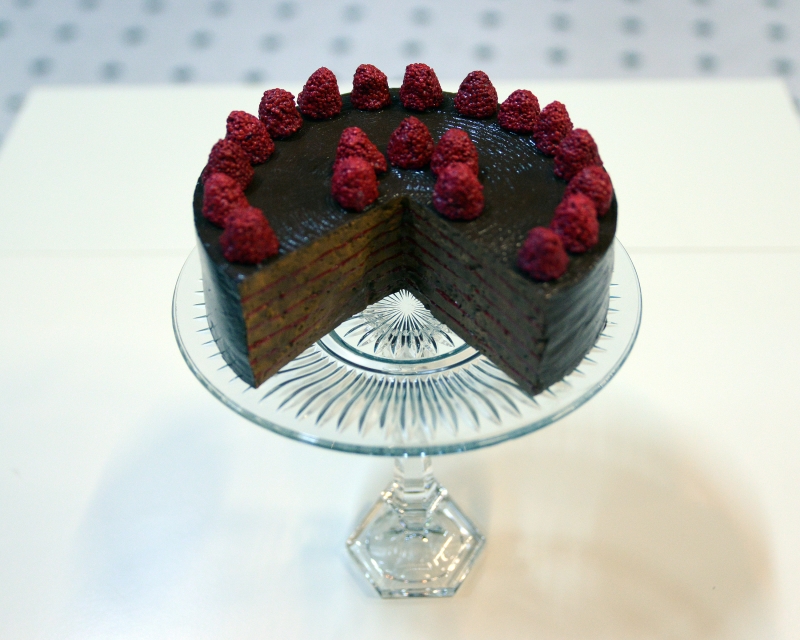
It helps that the set design in Della's shop flashes rows and rows of mouth-watering cakes to stare at. I found myself repeatedly distracted by a particularly delectable-looking chocolate number (as I am a gracious reviewer, I've included a picture for your enjoyment). Looking at those confections, I have no trouble believing what the script tells us about Della: she is a bona fide magician with a cake pan.
Della then meets Macy (Monica Cummings), a hyper-liberal journalist from New York who is anything but charmed by Della's optimistic worldview. Della is floundering, trying to have a meaningful conversation with Macy, but the awkward meter skyrockets when we meet Jen and learn that she and Macy are engaged - and she wants Della to bake their wedding cake.
Proper Southern woman that she is, Della is uncomfortable with the request and turns them down, stating that she will be too busy with other orders. But we, as well as Jen and Macy, know the real reason. The rest of the play unfolds as the characters try to reconcile the beliefs they have been instilled with and their affection for their loved ones.
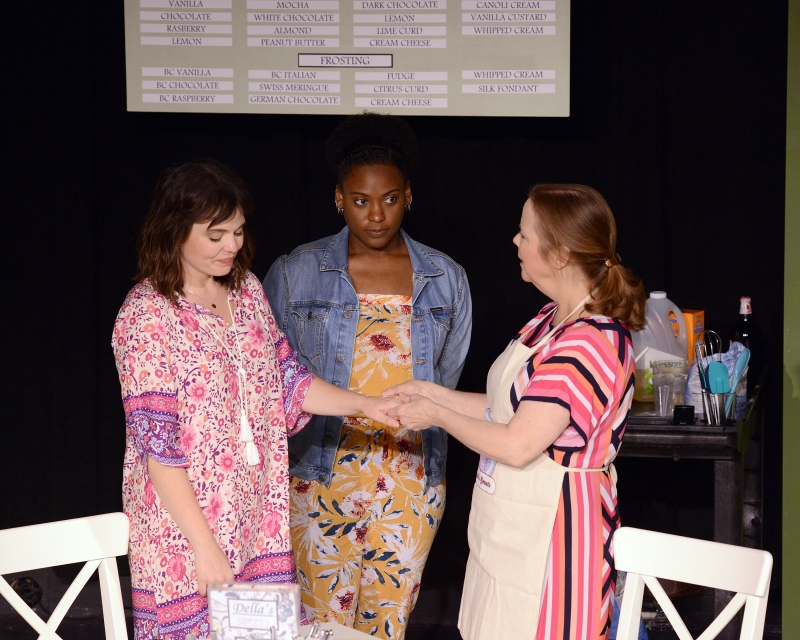
Monica Cummings and Laura Chapman
Photography Credit: Stageworks Theatre
Curiously, however, it is not Della but Jen whom we see struggling with this more. While Della indeed spends some time working through her doubts, a lot of her arc is also devoted to her stale marriage with her husband, Tim (Jonathan Rozas). Jen, however, spends the entire play being pulled in separate directions. Her mind is a battleground between her deep love for Macy and the pious hometown loyalty instilled in her as a child. Cooper mostly captures this fraught internal conflict, though she gets a little one-note in her more intense scenes.
As for Chapman, there are moments where her performance as Della comes across as a bit plastic. For the most part, however, she maintains a firm grip on the audience's heartstrings. She is particularly effective during her fantasy scenes where she imagines herself as a contestant on the "Big American Bake-Off." Her eager-to-please smile and bright-eyed optimism lend the character a vulnerability that betrays some deeper insecurities. This is a woman whose husband has not touched her in years, who bakes cakes because it is the one thing that makes her feel valued, and who desperately wants to feel needed.
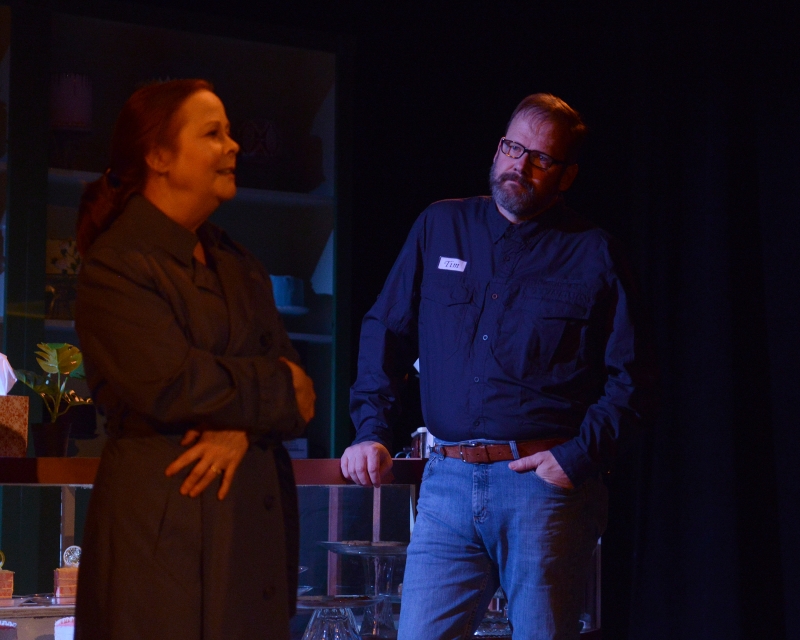
Photography Credit: Stageworks Theatre
This sincerity leads into what may be the production's most moving scene, in which Della and Tim have an honest conversation about why their passion for each other has dried up and vanished - and whether they will ever be able to get it back. This scene is the only chance that Rozas gets to show off his dramatic chops as Tim, who tends to keep his emotions close to his chest. Neither actor disappoints, and the scene becomes one of the tightest instances in the play of two actors connecting and listening to one another.
As for Macy, Cummings's performance is mainly straightforward, which matches Macy's direct, confrontational demeanor. However, Macy can also be one-dimensional at times (She's a liberal! She doesn't eat gluten! She reads Slate Magazine!) and neither Cummings nor director Lisa Garza does much to provide her with more depth. There are hints at deeper layers when she talks about the difficulties of being a black lesbian, but the script doesn't follow through on those threads, and the production doesn't weave them into Macy's other scenes.
I couldn't help but want those layers during Macy's interactions with Della. Macy and Della have perhaps the most interesting dynamic in the play, which is likely why Brunstetter chooses to have them end the play. Too often, however, I lose the sense that these characters actually want something from one another or that the actors are listening to each other. Of course, Macy is not listening to Della; she is simply using her as a target for her pent-up frustration (an argument could be made that Della is trying to listen to Macy). Still, even if the characters use each other as echo chambers, there needs to be some underlying motivation. Cummings and Chapman seem too unsure of their roles in the scene to give the conflict the sense of interiority that it needs to land.
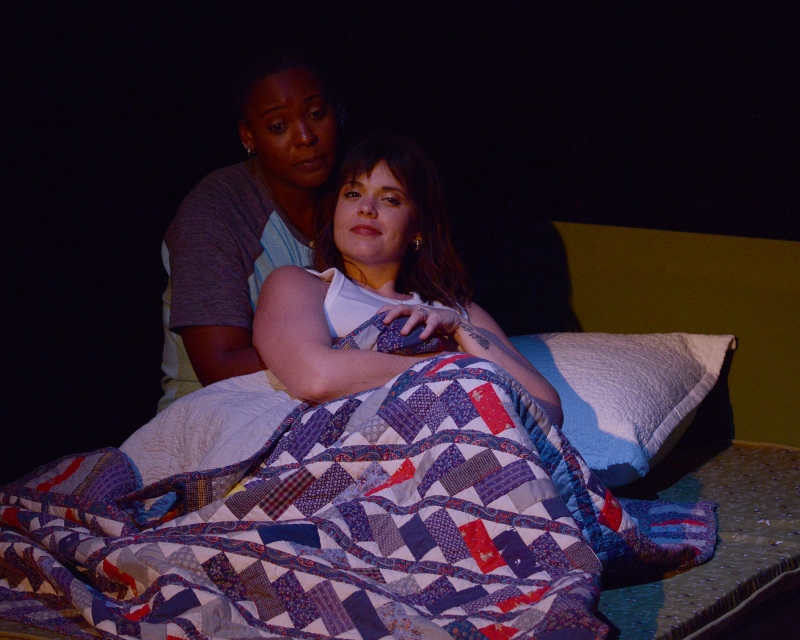
Photography credit: Stageworks Theatre
The main problem here is a lack of listening (ironic, given that listening to others is the play's most prominent theme). Too often, the actors seem to be acting at each other rather than with each other, and some scenes feel cold as a result. By no means do the actors lack charm or personality. Still, closer attention to their scene partners would help motivate their interactions and provide the sense of connection these scenes need. Without that connection, the show plays out like a well-meaning after-school special about homophobia. Sweet, amusing, and occasionally even quite heartfelt, but ultimately less than what Brunstetter gives us.
The costumes are solid all-around. Designer Roxanne Emery makes a fun decision for Jen and Macy's wedding, putting Macy in a white pants outfit with a sunflower wrap. The splash of color helps avoid turning the event into the stereotypical (and occasionally gender-coded) lesbian wedding in which one bride wears a dress while the other wears a suit. This choice instead gives the ensemble a sense of specificity.
Overall, Stageworks has taken a sweetly sentimental play with activist aspirations and pulled together a production that should appease its audiences. The pacing could be tightened, and certain story beats only hit the surface of what the script provides, but the show's heart is intact. The comedic timing also helps lighten the atmosphere and makes the audience more likely to forgive any flaws in the performances. When Della tries to entice her husband into having sex with her for the first time in years by covering herself in her homemade buttercream ("You know you love my buttercream..."), the audience cannot help but laugh.
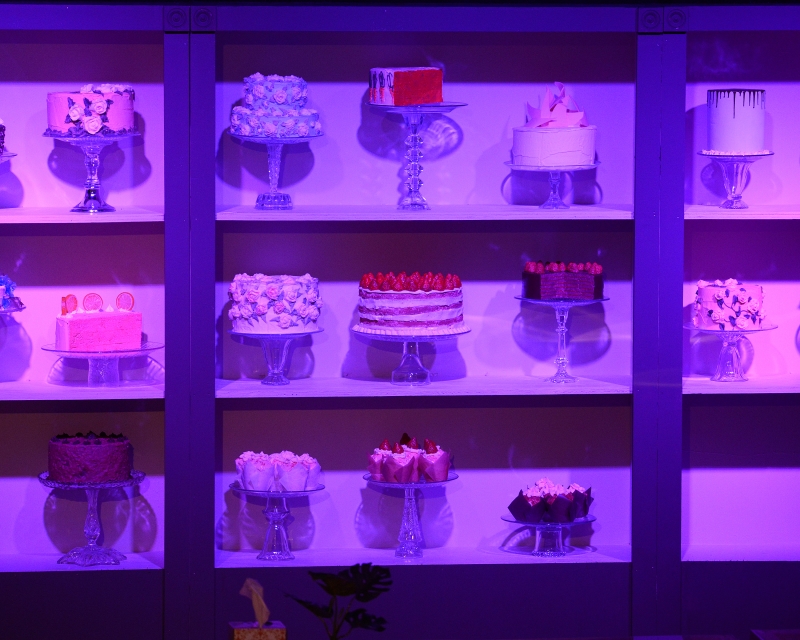
This production of The Cake may not be perfect, but what it lacks in thematic depth, it makes up for in confectionary charm and good intentions. If nothing else, it's worth seeing for the free cake you'll find in the lobby after the show! I recommend the German chocolate, though if you're more of a red velvet person, I guess we can learn to accept each other.
The Cake is currently running until April 3 at Stageworks Theatre. Tickets start at $21 and can be purchased at https://www.stageworkshouston.org/the-cake or by calling the box office at (281) 587-6100.
Reader Reviews

Videos

